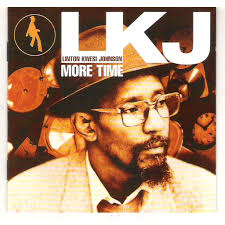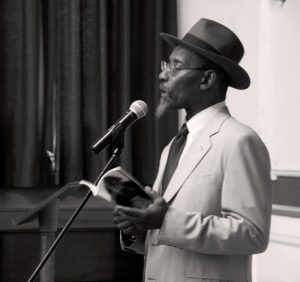Dubbing the Page: Teaching Linton Kwesi Johnson
 This week I taught Linton Kwesi Johnson again in my PostPunk Cultures seminar on the British 1980s. (I also teach him in Modern British Poetry). Each time I return to Johnson, also known as recording artist LKJ, his work reorients my understanding of how a poem can happen on the page. Take, for example, the opening to one of his poems about the 1981 Brixton riots, “Di Great Insohreckshan”:
This week I taught Linton Kwesi Johnson again in my PostPunk Cultures seminar on the British 1980s. (I also teach him in Modern British Poetry). Each time I return to Johnson, also known as recording artist LKJ, his work reorients my understanding of how a poem can happen on the page. Take, for example, the opening to one of his poems about the 1981 Brixton riots, “Di Great Insohreckshan”:
it woz in april nineteen eighty wan
doun inna di ghetto af Brixtan
dat di babylan dem cauz such a frickshan
an it spread all owevah di naeshan
it woz truly an histarical occayshan
(You can see the whole poem and hear LKJ read it here.) Dubbing the page, Johnson’s language and rhythms enrich the poem’s sound effects by transferring reggae music to the poetic line. In the process, he dubs Jamaican creole over the U.K.’s populist traditions, remixing the broadside ballad with Black British vernacular and Caribbean culture. In 1977 Johnson marked the emergence of what he called Dub-lyricism: “a new form of (oral) music-poetry, wherein the lyricist overdubs rhythmic phrases on the rhythm background of a popular song.”
The language Johnson uses in “Di Great Insohreckshan” usually makes more sense to non-speakers when they hear Johnson performing it (listen to a musical rendition here). Encountered on the page, individual words can confuse many of my students–although in this format a word can suddenly spark into linguistically adventurous meanings. For example, the histarical occasion of “Di Great Insohreckshan” is historical and hysterical at once: weighted with a deep history of violence, yet bubbling with the ludic energy of a reggae bass line. Naeshan widens its vowels, pushing against the restrictive spaces of the Nation as well as the page. Insohreckshan signals that the great event Johnson’s poem recalls requires an even greater reckoning. Such use of diction bamboozles standard distinctions between the vernacular and the avant-garde.
it (listen to a musical rendition here). Encountered on the page, individual words can confuse many of my students–although in this format a word can suddenly spark into linguistically adventurous meanings. For example, the histarical occasion of “Di Great Insohreckshan” is historical and hysterical at once: weighted with a deep history of violence, yet bubbling with the ludic energy of a reggae bass line. Naeshan widens its vowels, pushing against the restrictive spaces of the Nation as well as the page. Insohreckshan signals that the great event Johnson’s poem recalls requires an even greater reckoning. Such use of diction bamboozles standard distinctions between the vernacular and the avant-garde.
Linton Kwesi Johnson presides over his page like a dexterous DJ. In my seminar, the poems about Brixton seemed to bleed off the page into this week’s front page news about Charlotte, North Carolina. We marveled at how the revalueshanary language of this Tap Natch Poet strikes at the heart of these times. –MB
SOURCE for quotations:
Linton Kwesi Johnson, Mi Revalueshanary Fren: Selected Poems. Introduction by Russell Banks. Ausable Press, 2006.
Comments are currently closed.